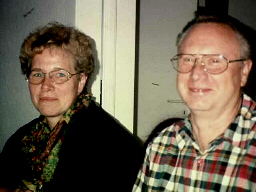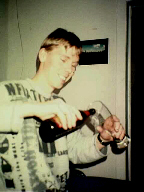
Gisela and Hans-Jürgen Kolpack
I arrived at the Hannover airport on Wednesday Sept. 25th at about
10:30, a short one hour flight from Paris on a Lufthansa Boeing
737.
A couple months earlier, after making plans for a vacation in
the Alps, I sent some email to Jens Kolpack about a possible stop
in Hannover on my way home. He said that he was getting married
during that time and invited me to his wedding. My first response
was one of reluctance since I didn't want to be a burden during
such a time. But Jens' response was "It is the time to meet
Kolpacks." So I gratefully accepted the invitation.
As I cleared the gate, I saw this blonde haired guy holding a
sign that read "KOLPACK." My first impression was that
this guy can't be a Kolpack; he's over 6 feet tall! But it was
Jens Kolpack, a typical 29 year old German wearing blue jeans,
a sweatshirt, and a black leather jacket. We exchanged a few pleasantries
and headed off to the parking garage.
Luckily
for me, Jens speaks perfect English since my German leaves much
to be desired. We went to his apartment where I met his bride-to-be
Minerva.
She is a wonderful person who immediately made me feel at home
and one of the family. She has beautiful dark eyes which she inherited
from her Turkish father, and an unbounded sense of humor.
That afternoon, Jens and Minerva hosted an afternoon get-together for
their parents. Minerva's parents has recently flown in from Ankara,
Turkey, and Jens' parents Hans-Jürgen and Gisela were stopping
by Hannover on their way home from a vacation in Italy. It was
the first meeting of the parents of Jens and Minerva.

Gisela and Hans-Jürgen Kolpack
The Kolpacks pulled up in their camper. Before they left, we all
got a tour of the camper and it reminded me of the camping trips
my family used to take when I was young. My Mom would love this
little camper.
That afternoon, I showed off pictures, maps, and talked (as best
I could with poor German and Jens' translations) about how I fit
into the Kolpack clan. Hans-Jürgen , in typical Kolpack fashion,
did not have a lot to say, and he looked a lot like my Uncle Earl.

Jens demonstrates proper technique for pouring Hefeweisen Beer
Wednesday night I went to a local brauhaus (brew pub) with Jens
where a bunch of his co-workers were celebrating.
Jens is a policeman with the Hannover Police. The guys I met were
all fairly young, very personable, and seemed to be liberal-minded
by American standards. Half of them, including Jens, wore an earring.
I made friends with Jens (a different Jens), Niels, Olaf, and
Oliver, all of whom spoke excellent English. Niels collects patches
from Police Departments from around the world, so I told him that
I would try get him one from Seattle and one from Fargo. Jens
gave me Hannover Police patches for trade.
Thursday, we slept in late (it was a late night). In the afternoon,
I accompanied Jens on a shopping trip for the Friday festivities,
and we stopped by the Hannover Police Dept. for a short time.
Jens works in the Robbery and Burglary division. He says that
the biggest problem in Hannover is with junkies.
Thursday night was spent making last minute preparations for the
big day.
However, there was some spare time Wednesday and Thursday for
some Kolpack family research. Jens had purchased a CD-ROM of German
names, addresses, and phone numbers. We found about 50 Kolpack
listings. They appeared to be concentrated in three areas: Lower Saxony
(Jens' family), the Ruhr, and Berlin. Most had no information,
but those that did said they were also from West Prussia.
Jens got some interesting information talking to the 76 year old
wife of a Wilhelm Kolpack. She said that there were some Kolpacks
who moved from West Prussia to East Prussia (Königsberg area)
to work in some mines, and then moved to the Ruhr after WWI.
Also very interesting was a conversation he had with a Berkhart
Kolpack. A couple years ago, Berkhart visited the Rosenberg area
to see if there were any Kolpacks left. He found out that a Gottfried
Kolpack had died a poor man just a few years earlier. He was the
last Kolpack in Rosenberg and was somehow left behind during the
exodus of 1945. (In 1945, millions of Germans were kicked out
of Prussia by the Russians and Poles and walked hundreds of miles
West as political boundaries we redrawn.)